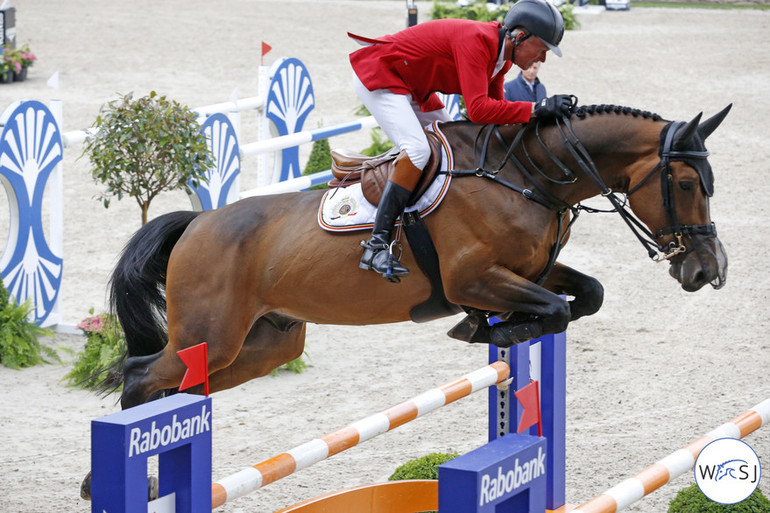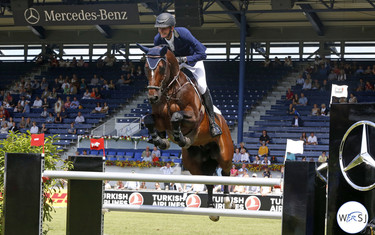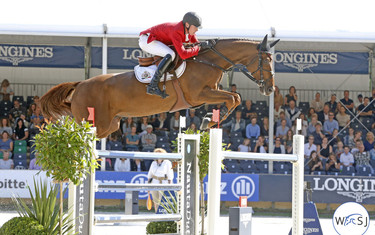Jos Lansink has a career few can match – he has competed at six Olympic Games, four times under the Dutch flag and twice representing Belgium. On top, he was crowned World Champion in Aachen in 2006. Since 2004 he has been running his own business, a commercial dealing stable – today with 52 horses and two riders under his guidance. WoSJ sat down with the 57-year-old legend to discuss the development he has witnessed in our sport, and what has changed for him along the way.
“When I was younger, I just rode horses and managed the stables. Now I have to make a living, and I also train and help people much more,” Jos begins. “I do enjoy it, the whole operation around it. I also do a lot of selling, and what happens after the sale is also very important for me. You have to help your clients in getting to know their new horses,” he tells about his philosophy.
Two young talents, Pieter Clemens and Frank Schuttert, work for Lansink. “Frank has been here nearly five years and Pieter for about two years,” Jos tells about his riders. “You never know before you start to work together… It has to work for the whole team,” he explains about the challenge of finding a good rider as well as a team player. “These two, they both want to get better. I think with me, they learn a lot, but it has to come from both sides. Not every horse is the perfect match for one rider, so sometimes we need to change. That is also the advantage of having more riders, that we can change. But in the end, everyone has to be happy,” Jos says. Jos has a daughter who is not involved in the sport and having the two boys around feels like extended family to him. ”They do feel like family to me,” he smiles.
How would the 2006 World Champion describe himself as boss? “I am strict but not difficult,” Jos says. “Being on time is important for me. And the respect for each other. I think the respect is the most important thing, actually. We need to be here to help each other. I believe that you have to work for everything you get in life. Everything I have, I had to work for it,” he goes on. “Nothing comes by on its own. I always say that the weather changes every day by itself – for the rest, you have to work for it!” he smiles. “For sure everyone who works with horses knows how difficult it is. What has changed a lot in the sport, is that 30 years ago you maybe had five or six very good combinations that could win Grand Prix classes and these days it is the opposite; you have a few combinations that never win, the rest all have a chance for a good result.”
“You can’t win every class, so the most important thing is that you see the horses getting better,” Jos continues. “To me it seems like everyone likes to do things quick, but I think it is very important to remember that horses are not machines. They need time. I think that the longer and quiet way, giving the horses the time they need, is the best way. And then there is the other side of the medal, too; the horses need to stay sound. Things can change so quickly – sometimes you go quickly up, but that is also the same way back. That is the scary thing in our sport.”
And when it comes to everything changing from one day to another, Jos knows what he is talking about. Being diagnosed with cancer just before the Rio Olympics in 2016 was a wake-up-call he won’t forget. “That day for me, it was a shock,” he tells. “I never felt sick. And then one day I was told that there is a problem. I hope everything is under control now, because for now it all looks good. But it was a year and a half that I was out of competition.”
“I used to do a blood test two times every year, just to stay on track of my health. Before May 2016 a few results were already a bit higher than usual, and then in May my doctor asked me what it was I wanted to do that year,” Jos tells us. “And I told him that I wanted to ride in the Olympics in Rio, in August. He looked at the papers once more and said very quickly, that after Rio I would need to check everything proper. The way he said it was a bit too quick in my opinion, so the next week I was already at a specialist. Three weeks later I was operated. It all went so quick, and it all really puts you in a different world; I never had something wrong with me; maybe once broke a leg or a collarbone, but that is nothing compared to cancer,” he says. “After that, you don’t think about the boys having one or two down, or a horse not passing a vet check. You just have one dream; that you are soon better and back in the saddle.”
For now, Lansink enjoys each day as it comes. “Now, even if I have one down, I enjoy it. That is why I go to the shows; because I enjoy it. That is what I am going to do, I have no goals,” he says. “All my horses are for sale. I really enjoy riding a young horse at a local show – I don’t need to ride a big class at a big show,” he goes on.
“My motivation? We have a big stable, so we have to work for something. I enjoy the whole thing around; to support people, to ride myself, to buy a horse that gets better. I am simply enjoying the sport.”
Text and pictures © World of Showjumping
No reproduction without permission











